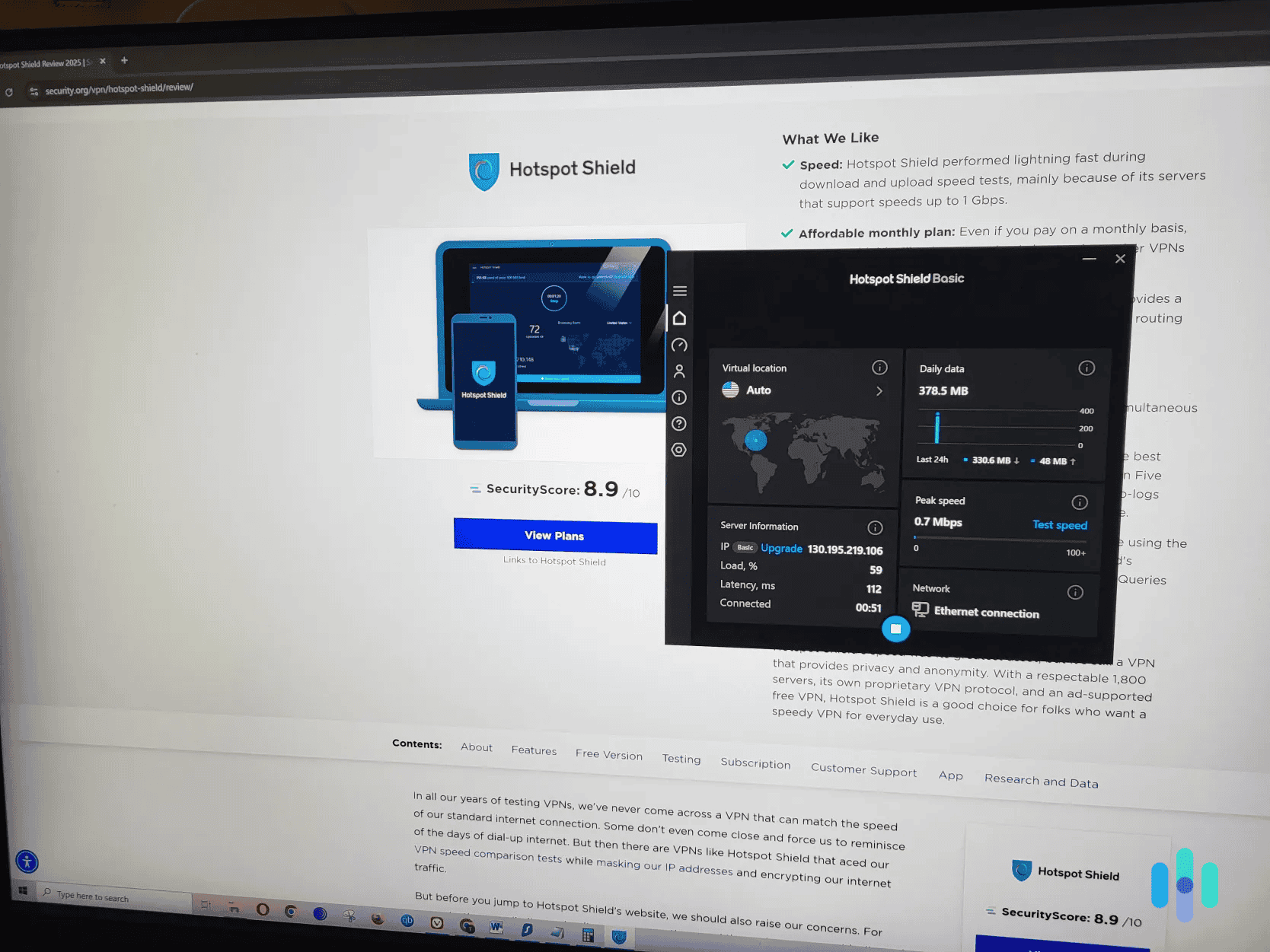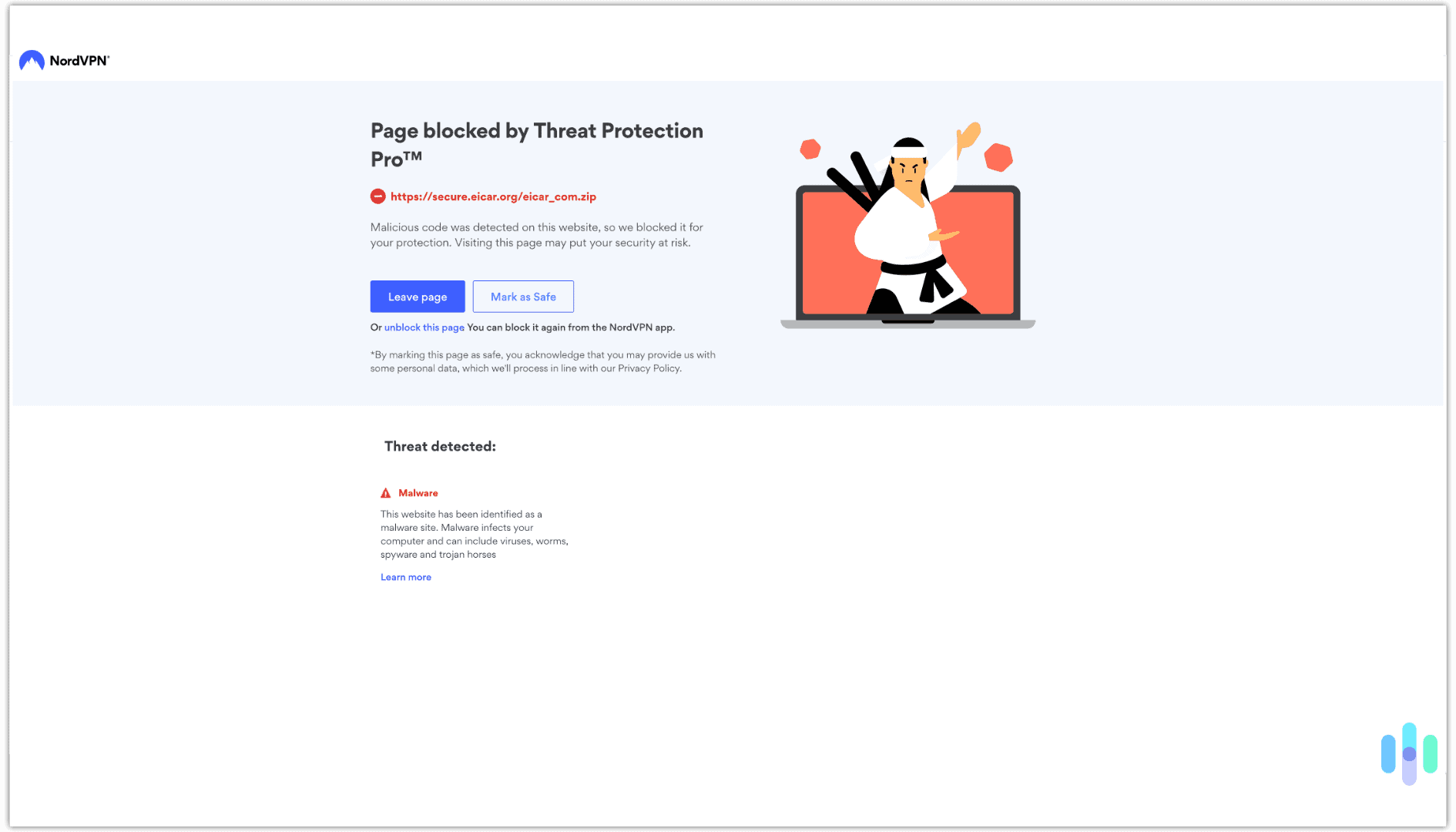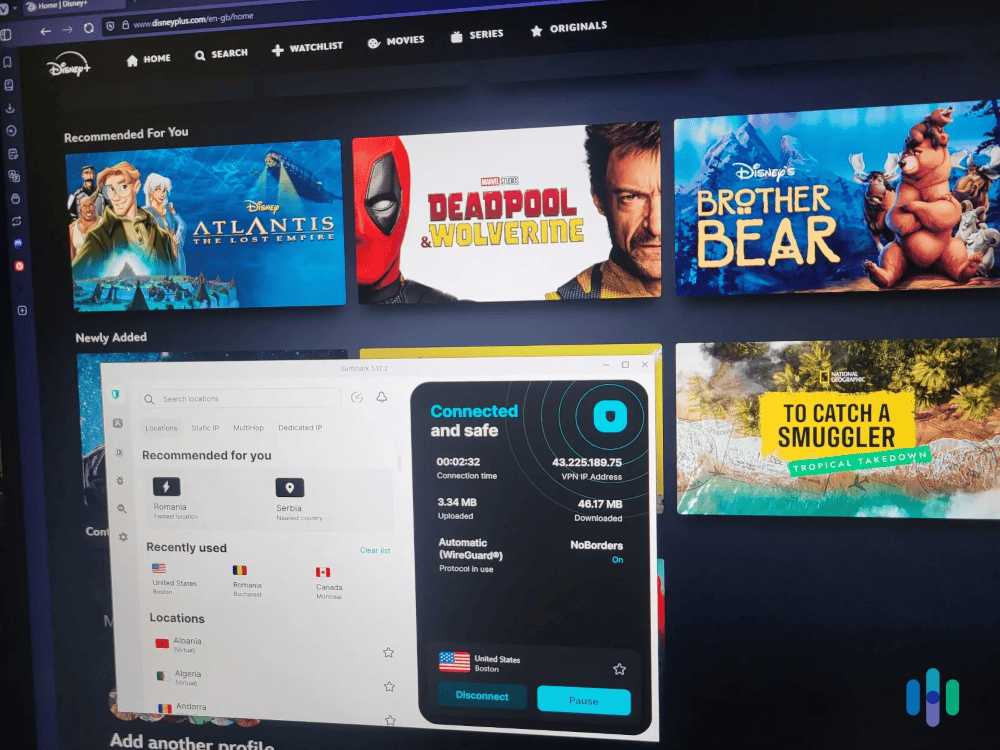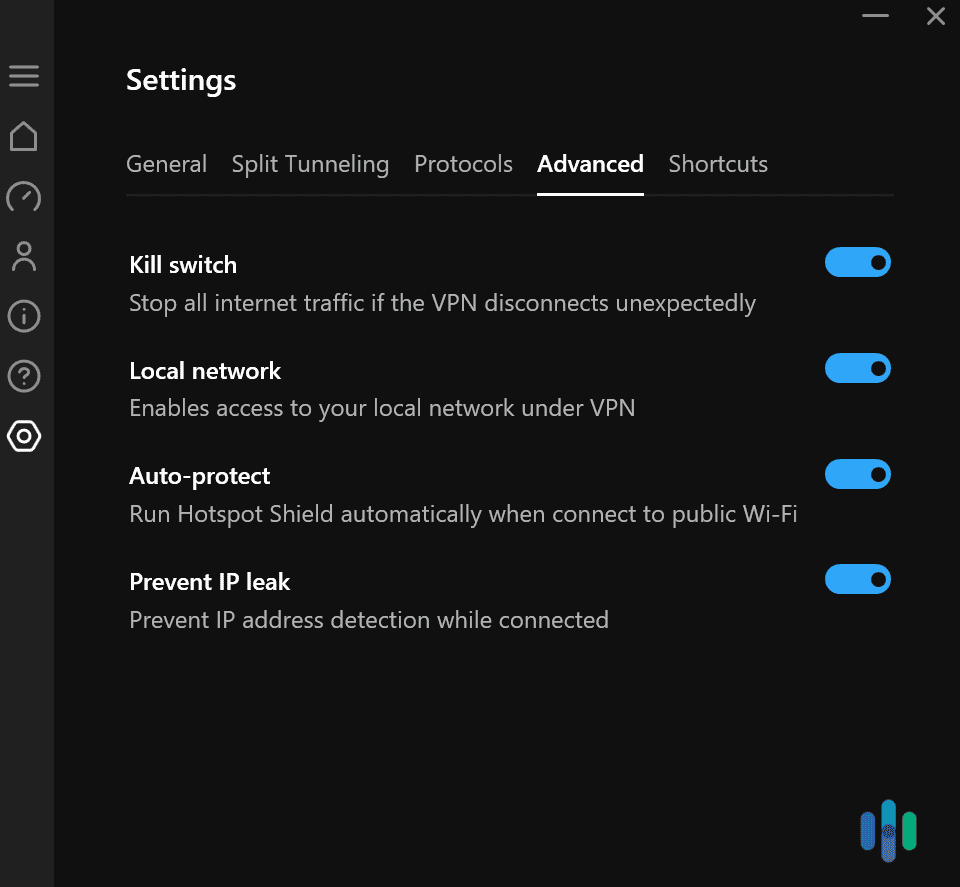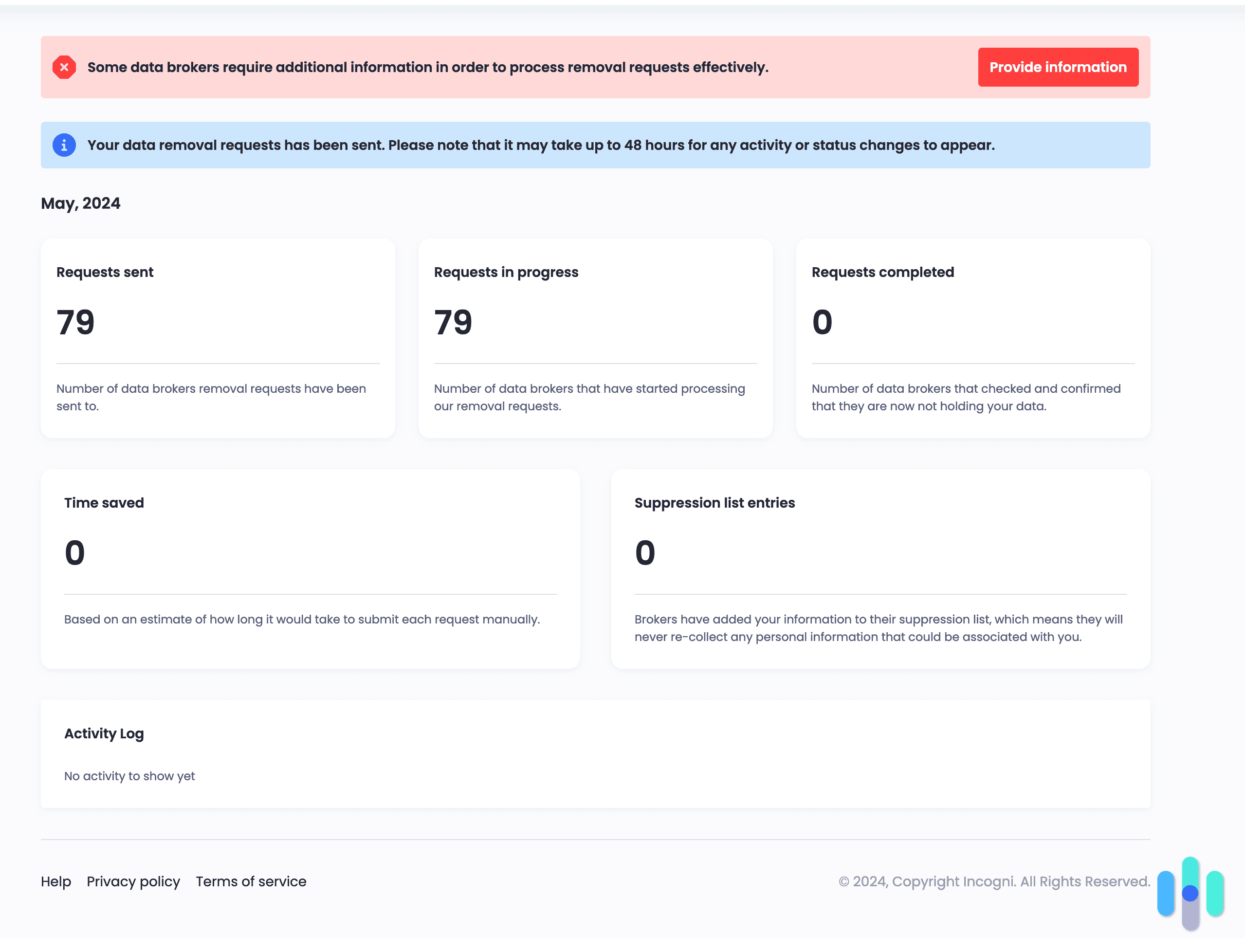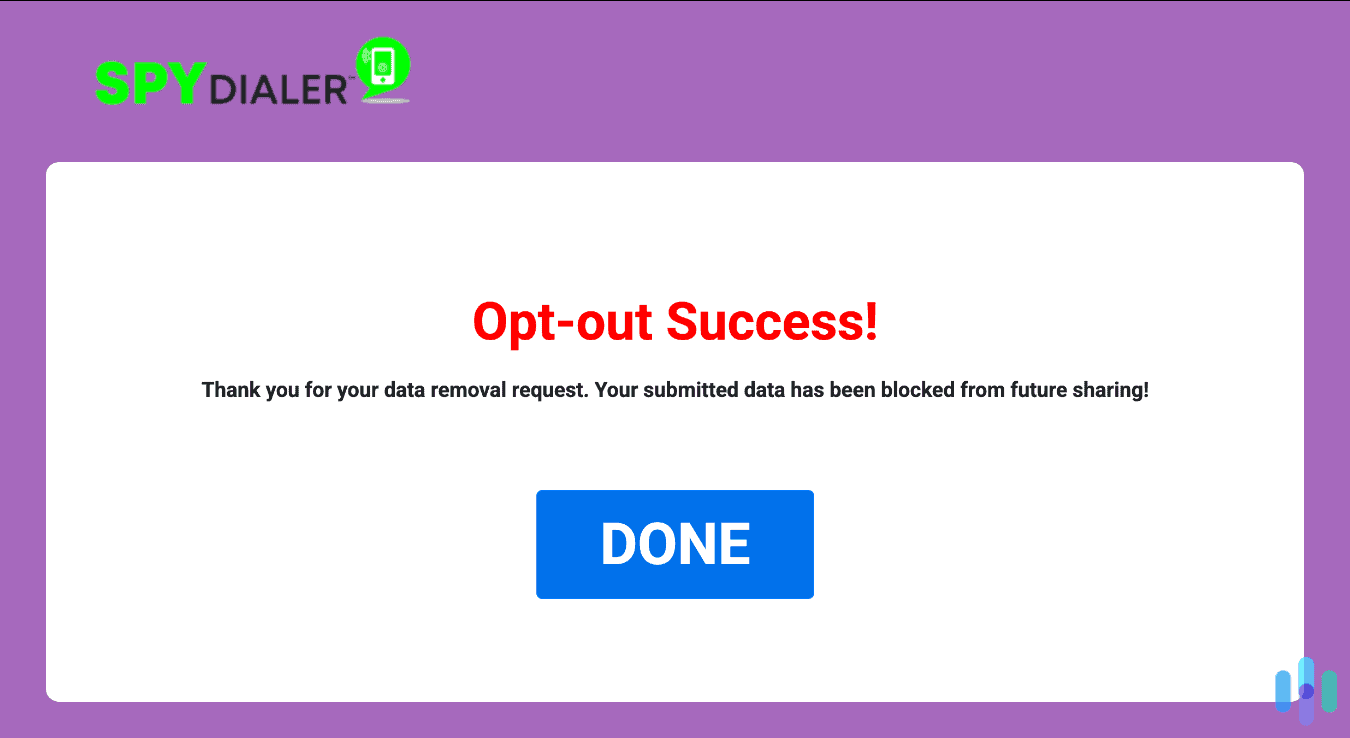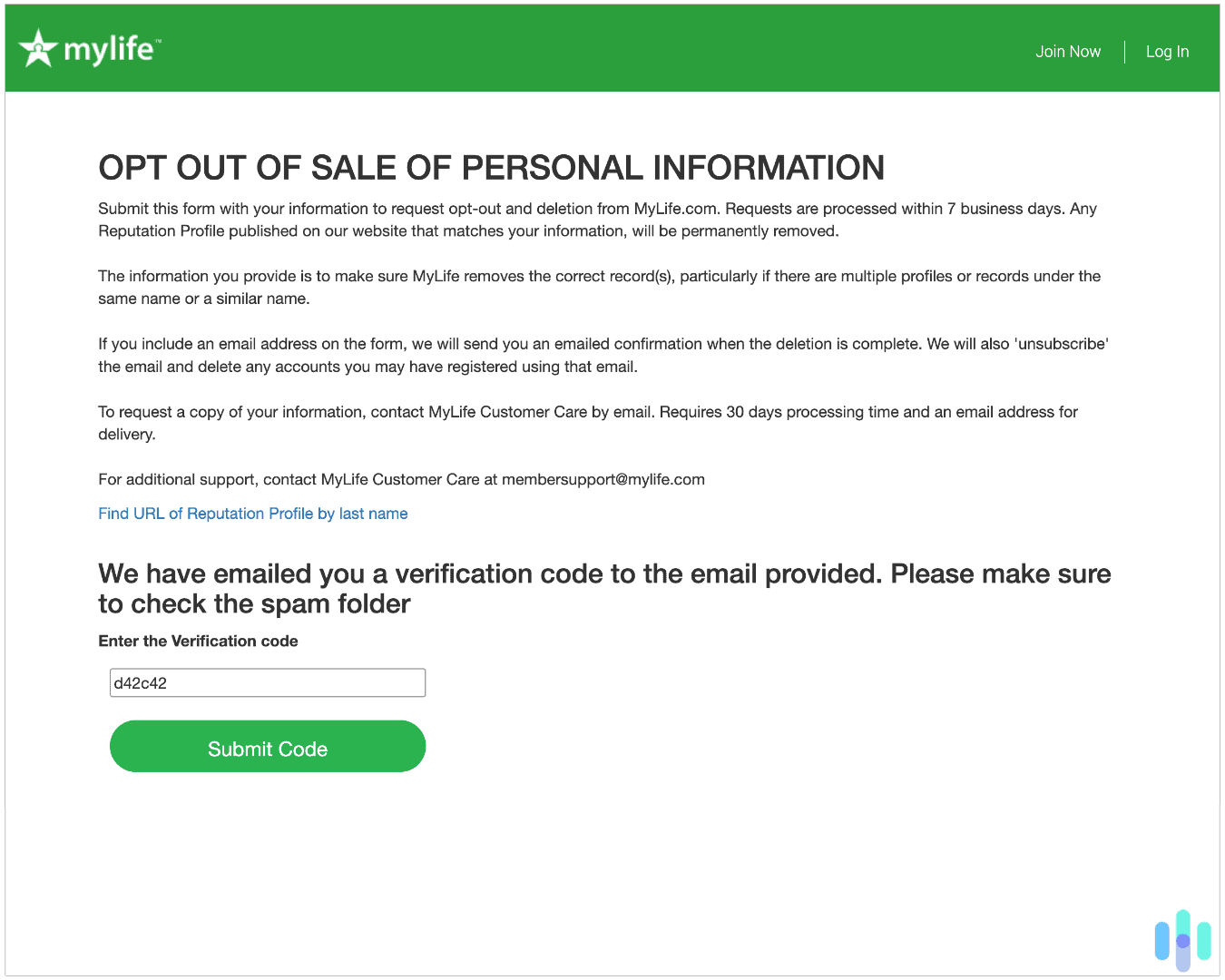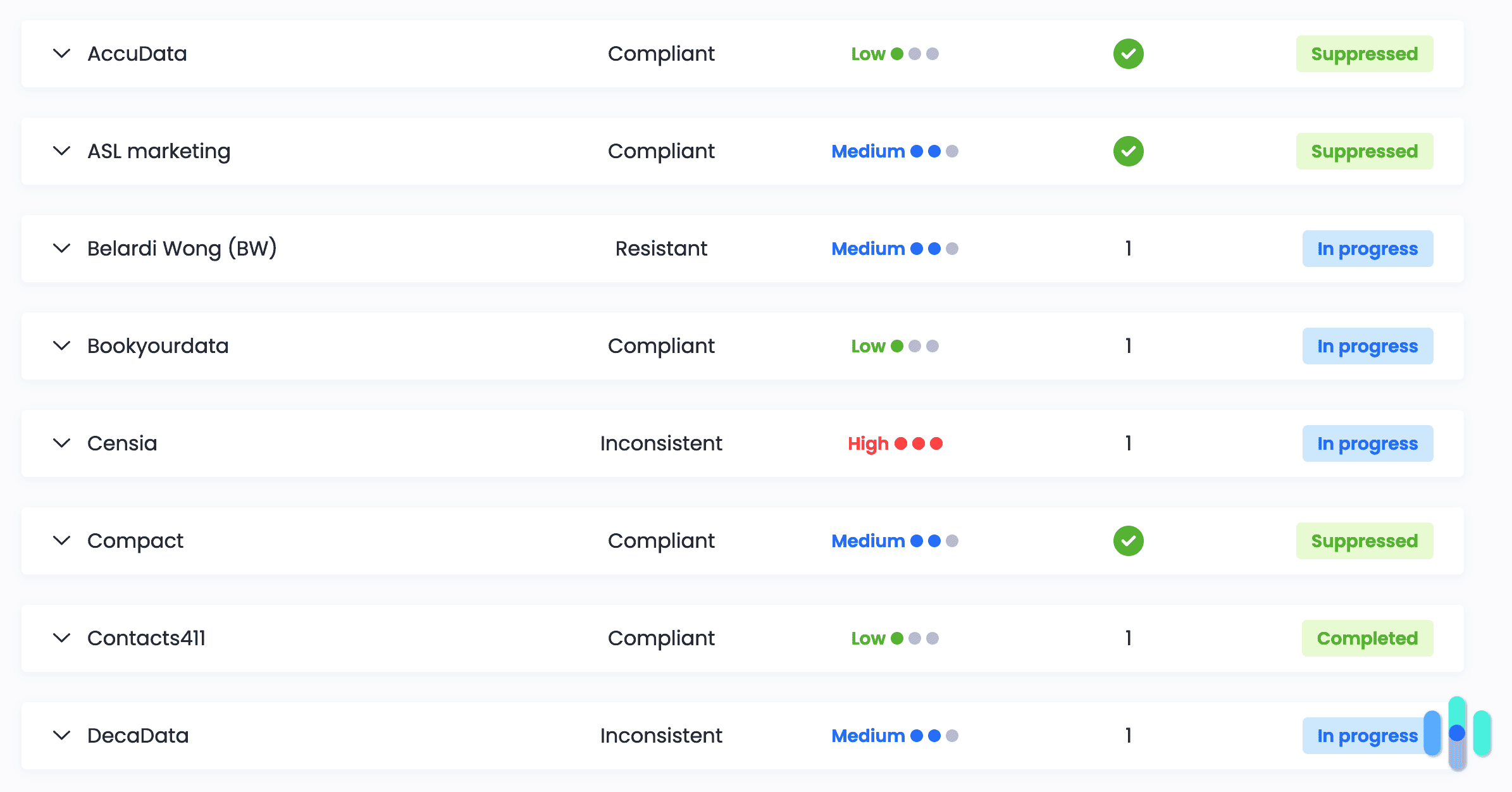The Best Free VPNs in 2025
Hotspot Shield is the best free option in 2025 according to our tests — it provides unlimited data, it’s very fast, and it’s also secure and easy to use.
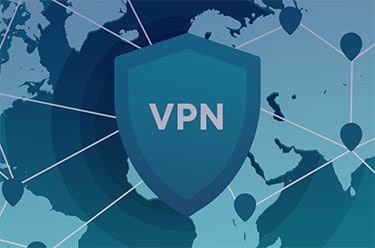

- Free version provides unlimited bandwidth
- Provides great security and privacy features
- Offers extremely fast speeds
- Free version provides unlimited bandwidth
- Provides great security and privacy features
- Offers extremely fast speeds

- Has a 30-day refund that lets you test the VPN risk-free
- Protects against malware-infected downloads, ads, and malicious websites
- Has extra security tools, including a dark web monitor and double VPN servers
- Has a 30-day refund that lets you test the VPN risk-free
- Protects against malware-infected downloads, ads, and malicious websites
- Has extra security tools, including a dark web monitor and double VPN servers

- Works with tons of popular streaming sites, as well as over 20 Netflix libraries
- Maintains very fast speeds for streaming HD and 4K videos
- Offers a risk-free 30-day money-back guarantee
- Works with tons of popular streaming sites, as well as over 20 Netflix libraries
- Maintains very fast speeds for streaming HD and 4K videos
- Offers a risk-free 30-day money-back guarantee
There’s nothing wrong with going with a free VPN, as long as you know it’s safe and you’re okay living with data, server, or device limits. In fact, we’re going to help you pick a fast, safe, and secure free VPN in this guide.
Hotspot Shield is our first recommendation. Even though it has server and device limits, you can keep using it as long as you want. We also recommend premium VPNs you can try risk-free, such as NordVPN – it backs all purchases with a 30-day refund, which works essentially like a trial period. Surfshark is another great option. It provides a 7-day trial and also has a 30-day refund policy.
Keep reading to learn more!
>> Check Out: The Best VPNs
The Best Free VPNs of 2025
- Hotspot Shield - Best Free VPN Overall
- NordVPN - Best for Security
- Surfshark - Best for Streaming
A Disclaimer About Free VPNs
We don’t normally recommend using free VPNs, as they come with various limitations. For example, they could cap data usage each day or month, and limit speeds or simultaneous connections. Or they might not work with streaming sites, or allow torrenting.
Most free VPNs are also not completely safe. Many of them might log your data, and then sell it to advertisers. Even worse, some free VPNs could even infect your device with malware.
If you insist on using a free VPN, stick to our number one pick since it’s 100 percent safe to use. But we also recommend trying out the premium VPNs on our list, as you can test them risk-free thanks to their generous money-back guarantees.
Side-by-Side Comparison of the Best Free VPNs of 2025
| System |
Hotspot Shield

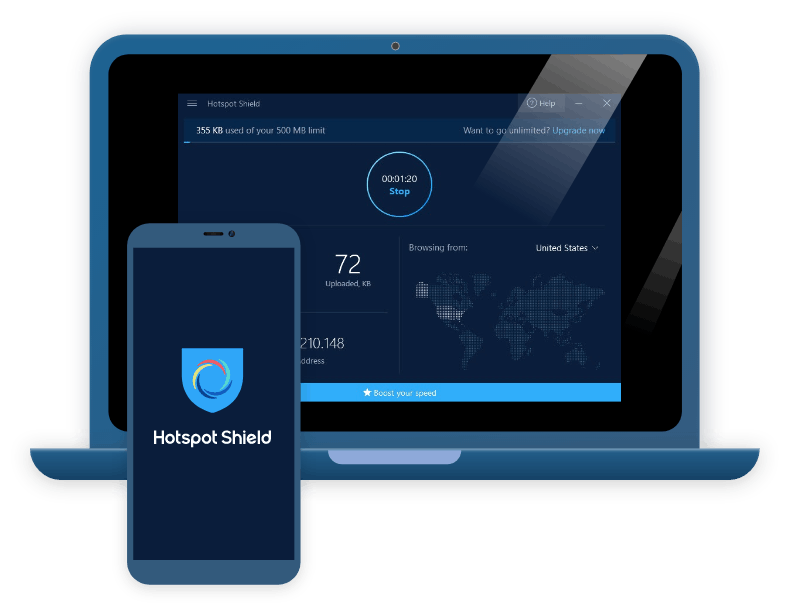
|
NordVPN

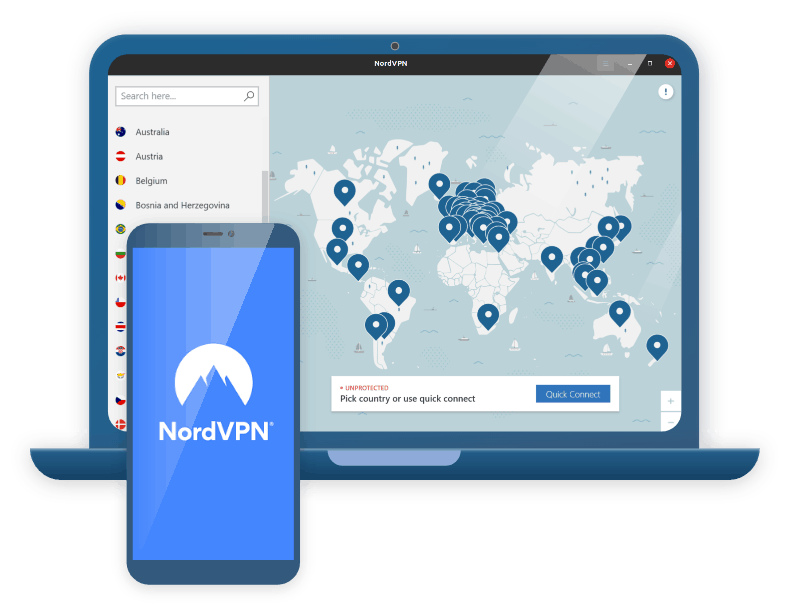
|
Surfshark


|
|---|---|---|---|
| Ranking | 1st | 2nd | 3rd |
| Ratings | 8.9/10 | 9.7/10 | 9.5/10 |
| Displays Ads | Only on mobile | No | No |
| Data Caps | None | None | None |
| Connection Speed Limits | No speed limit (desktop) 2 Mbps limits (on mobile) | No speed limit | No speed limit |
| Number of Countries | 3 (free version) 85 (paid version) | 118 | 100 |
| Split Tunneling | Yes | Yes | Yes |
| 5 Eyes, 9 Eyes, or 14 Eyes Member | Yes | No | Yes |
| No-Logs Policy | Yes (independently audited) | Yes (independently audited) | Yes (independently audited) |
| Read Review | Hotspot Shield Review | NordVPN Review | Surfshark Review |

A Closer Look at the Best Free VPNs of 2025
-
1. Hotspot Shield - Best Free VPN Overall
 View Plans Links to Hotspot Shield
View Plans Links to Hotspot ShieldProduct Specs
Multi-hop Yes Obfuscated servers Yes Kill switch Yes Split Tunneling Yes Netflix Yes, but not in all regions Torrenting Yes 
How to Use Hotspot Shield for Free
Hotspot Shield offers a free plan. Just download and install the VPN’s app, sign up for a free account, and start using the service. The free version is excellent for desktop users, as it offers unlimited data, strong privacy, and fast speeds. However, mobile users have to put up with ads and 2 Mbps speed limits.
What We Like
- The free plan provides unlimited data and speeds on desktop
- The free version provides strong security and privacy
- Has pretty fast speeds
What We Don’t Like
- On mobile, the free version displays ads and limits speeds to 2 Mbps
- The free version limits you to one connection
- Only paid users get access to the smart TV apps
Security & Privacy
Hotspot Shield’s free version has strong security and privacy protections in place. It has a strict no-logs policy, which we read through and can confirm it doesn’t log user IP addresses or browsing traffic. Free users also get access to a kill switch, which protects against traffic leaks (most free VPNs lack this security feature).
Streaming, Torrenting, & Speeds
Hotspot Shield’s free plan doesn’t officially support streaming and torrenting, but it doesn’t restrict VPN speeds. Hotspot Shield doesn’t guarantee streaming and torrenting support with its free version. We tried using it to change our Netflix region, and we were unsuccessful. But when we used a free server to download a few torrents, it worked. We can’t promise you’ll have the same luck as us, but at least there’s a chance.
On desktop, Hotspot Shield’s free plan doesn’t impose speed limits. In our tests, it also reduced our download speeds by no more than four percent. This is very impressive, considering free users only get three countries (the U.S., Singapore, and the U.K.).
>> Related: The Best Free VPNs for Torrenting
Pricing
Hotspot Shield’s paid plans aren’t the cheapest out there. Its prices start at $12.99 per month, but with a longer commitment (3 years), prices can drop to as low as $2.99 per month. The VPN also has a 45-day money-back guarantee.
1-Month Plan $12.99/month 1-Year Plan $7.99/month 3-Year Plan $2.99/month The paid version adds servers in 85 countries (versus 3 with the free plan), lets you watch Netflix and other streaming sites, and removes ads on mobile.
-
2. NordVPN - Best for Security
 View Plans Links to NordVPN
View Plans Links to NordVPNProduct Specs
Multihop Yes Camouflage Mode Yes Kill switch Yes Split Tunneling Yes Netflix Yes Torrenting Yes 
How to Use NordVPN for Free
NordVPN backs all plans with a 30-day money-back guarantee, which you can use to your advantage to test it for free. Buy the VPN, test it for up to 30 days, and get your money back if you’re not happy with it. Plus, NordVPN often runs special promotions and deals that sometimes offer additional months of service for free (like NordVPN’s Black Friday sale, for example).
>> Learn More: NordVPN Deals
What We Like
- Backs all of its plans with a risk-free 30-day refund
- Often runs special promotions that offer extra months of service for free
- Provides excellent streaming and torrenting support
- Is one of the fastest VPNs on the market
What We Don’t Like
- Price increases after the initial term
- Not the most affordable VPN in 2025
- Money-back guarantee applies only to your first purchase
Security & Privacy
NordVPN keeps you safe against malicious threats with its Threat Protection Pro feature. NordVPN offers excellent security, as it protects against malware-infected downloads with its “Threat Protection Pro” feature. The tool also blocks ads and connections to shady websites — in our tests, it got rid of over 90 percent of ads (even YouTube video ads).
NordVPN also uses RAM-only servers, ensuring that data is never written to the hard drive. This way, all data is wiped every time a server is rebooted. Add to that the VPN’s strict, independently audited no-logs policy. That’s why it’s best for security and privacy.
Streaming, Torrenting, & Speeds
NordVPN is excellent for streaming — we used it to watch Disney+, Amazon Prime Video, and Netflix, and it always worked without issues. It’s also one of the best torrenting VPNs in 2025, as it allows P2P traffic on servers in over 110 countries. Plus, it has SOCKS5 proxy servers that change your IP address, but don’t encrypt your traffic, offering much faster P2P speeds.
NordVPN is also one of the fastest VPNs in 2025. In our tests, it reduced download speeds by no more than six percent, and upload speeds by only four percent. We used it while streaming on Netflix, and all videos loaded instantly, plus they didn’t buffer when we skipped through them.
>> Read More: Speed Test Results from Top VPNs
Pricing
NordVPN has several tier-based subscriptions: “Basic,” “Plus,” “Complete,” and “Prime.” “Basic” has all VPN features, except “Threat Protection Pro,” whereas “Plus” adds “Threat Protection Pro” and NordPass, a good password manager. We picked the “Plus” subscription for this guide, but “Basic” is also a good pick if you already have an antivirus or a password manager.
NordVPN Subscription 1-Month Plan 1-Year Plan 2-Year Plan Basic $12.99/month $4.99/month $3.39/month Plus $13.99/month $5.99/month $4.39/month Complete $14.99/month $6.99/month $5.39/month Prime $17.99/month $9.99/month $7.39/month If you want more security services, “Complete” adds secure cloud storage, and “Prime” adds basic identity theft protection.
>> Read More: How Much Does NordVPN Cost?
-
3. Surfshark - Best for Streaming
 Get Free Trial Links to Surfshark
Get Free Trial Links to SurfsharkProduct Specs
Multi-hop Yes Camouflage Mode Yes Kill switch Yes Split Tunneling Yes Netflix Yes Torrenting Yes 
How to Use Surfshark for Free
Surfshark has one of the best free VPN trials in 2025. It offers a 7-day free trial that provides access to all VPN features, allowing you to test it risk-free. And once the trial and you buy a plan, you’ll also be covered by a 30-day money-back guarantee (just like with NordVPN).
What We Like
- Offers a free 7-day trial
- Provides excellent streaming support
- Allows unlimited simultaneous connections
What We Don’t Like
- Upload speeds are pretty sluggish
- The monthly plan is a bit expensive
Security & Privacy
Surfshark has CleanWeb, which is very good at blocking ads and shady sites — but it can’t block malware-infected downloads like NordVPN’s “Threat Protection Pro.” It also has “Alternative ID,” a privacy tool that lets you create email aliases, which is ideal for signing up on sites you don’t fully trust.
The VPN also has a strict no-logs policy that has been independently audited. Plus, it provides enhanced privacy via Dynamic MultiHop, which hides your real IP behind two VPN IPs instead of just one.
FYI: Dynamic MultiHop also adds an extra layer of encryption. This provides better security, but could also cause noticeable slowdowns — up to 20%, according to our tests.
Streaming, Torrenting, & Speeds
Surfshark is an excellent pick for accessing streaming services. Surfshark is one of the best streaming VPNs in 2025. We used it to successfully watch Netflix, Disney+, Crunchyroll, YouTube TV, and Max. Plus, it’s particularly good for Netflix, as it works with over 20 libraries.
Surfshark also allows torrenting on all servers, but doesn’t have extra speed-boosting features, like NordVPN has. If you’d like to read more, check out our Surfshark vs. NordVPN comparison.
The VPN has good download speeds, as it reduces them by no more than eight percent. However, its upload speeds are slower than NordVPN — we experienced a 50 percent speed decrease. NordVPN only slowed down upload speeds by four percent.
FYI: On Android, Surfshark also hides GPS data, matching it to the VPN IP you’re using. This makes it much harder for mobile streaming apps to block your connection.
Pricing
Surfshark has a 30-day refund for all plans and three paid tiers: “Surfshark Starter,” “Surfshark One,” and “Surfshark One+.” We recommend “Surfshark Starter” since it includes all core VPN features — and with the longest plan, it also only starts at $2.19 per month.
Surfshark Starter Subscription Costs 1-Month Plan $15.45/month 1-Year Plan $3.19/month 2-Year Plan $2.19/month “Surfshark One” and “Surfshark One+” add more security services. “Surfshark One” includes Surfshark Antivirus and a privacy-focused search engine, and “Surfshark One+” adds a data removal tool (Incogni).
>> Read More: How Much Does Surfshark Cost?
Methodology: Our Process for Testing Free VPNs

Our cybersecurity team spent over 2,500 hours testing more than 50 VPNs with free options or free trials. For each VPN, we installed its app on all of our devices and then used it on a daily basis for at least a week. During that time, we assessed them based on these four main criteria:
- Performance: We run speed tests on several servers and compare the speed to our base connection. On top of speed, we also check for how well the VPN unblocks websites with geo-restricted content.
- Privacy and Security: Before installing each VPN, we thoroughly research its privacy policy, security protocols, and any past security or privacy breaches.
- Free Plan Options: Every VPN limits the capabilities of their free plan in one way or another. We look for providers that never compromise on privacy and security.
- Torrenting and Streaming Support: Beyond offering support for torrenting and streaming, we also prioritized free VPNs that can support the bandwidth required for torrenting and streaming.
All of our testing is carried out by experts in the cybersecurity industry with decades of combined experience. We also consult with third-party professionals to confirm the results of our tests.
What to Avoid When Looking for a Free VPN
We recommend avoiding free VPNs that display any of the following signs:
- Unclear, vague, or non-existent privacy policy. A free service should still mention what data it collects, how it uses it, who it shares it with, and how it secures it. Free options that don’t provide that information are likely going to profit off of your data.
- Community-powered networks. Some free VPNs operate without servers by utilizing their users’ devices and networks as proxy servers. If you connect to a “server” in Australia, for example, that’s actually the network of another user in Australia. So, your IP address will be tied to the internet activity of whoever’s connected to your network. If they use it for illegal activities, you could be legally liable.
- No company background. It’s best to avoid VPNs with generic names, especially if they don’t make their company background public. You need to know who owns the service you’ll entrust with protecting your data.
- Too many ads. It’s normal for free VPNs to show ads – even our top-pick Hotspot Shield does it – but some go overboard showing ads every few seconds. Even worse, there are free VPNs that will inject ads into your browsing (basically, a type of adware).
- Malware. Free VPNs that are malicious will obviously try to hide it. That’s why we recommend installing antivirus software on your device before using a free VPN. The antivirus will detect the malware, and immediately get rid of it.
- Confusing or buggy VPN apps. If you need to sideload or use third-party software to install the free VPN, it’s best to avoid it. We also recommend staying away from free VPNs whose apps are hard to use, crash frequently, or have features that don’t work.
- Lack of customer support. Free VPNs generally don’t provide live chat support. But at the very least they should offer a detailed support section or responsive email support. If the free service doesn’t offer any support options, it’s best to avoid it.
- Device performance issues. If your device starts running poorly after installing a free VPN, that’s another red flag. The VPN could be doing something else in the background besides connecting you to a tunnel, like sniffing for passwords, downloading bloatware, or infecting your device with malware.
Do Free VPNs Work on All Devices?
Free VPNs have apps for most desktop, mobile, and smart TV devices. Many of them even allow you to set up their services on a router. If you do that, you basically circumvent the one-device restriction many of them have.
However, some free VPNs only provide access to certain apps to paid users. For example, you need to have a paid Hotspot Shield subscription to use its Android TV or Fire TV app.
FAQs About Free VPNs
-
What are the best free VPNs of 2025?
Hotspot Shield is the best free service overall. However, we also recommend testing NordVPN and Surfshark risk-free, just so you can compare what free and premium VPNs can do. Both are paid VPNs that offer a 30-day money-back guarantee.
-
Can free VPNs bypass geographic restrictions?
Usually no, as they don’t refresh the IPs of their free servers very often. So, it’s very easy for streaming services to detect and block them. However, some free VPNs we tested occasionally worked with streaming sites.
-
What are the limitations of free VPNs?
The limitations of free VPNs often include data usage limits, speed capping, and limited simultaneous connections. Some VPNs may also limit the number of server locations you can access.
-
Are free VPNs safe?
Not all free VPNs are safe, which is why we recommend getting a free version of a reputable paid VPN rather than downloading a VPN advertised as 100 percent free.
-
Are free VPNs the same as proxies?
No. Most free VPNs encrypt your data and hide your IP address, whereas proxies only change your IP address (so, they’re less secure).


